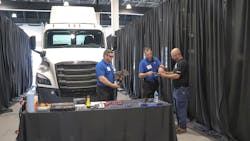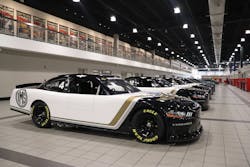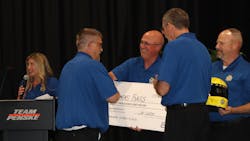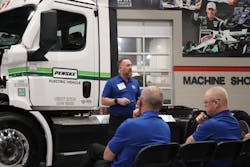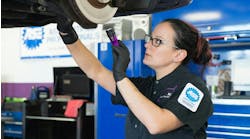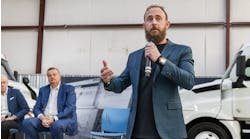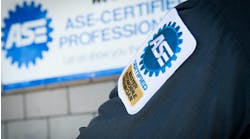Focus on training and competition a winning combo for Penske
MOORESVILLE, North Carolina—Hot off Team Penske’s first-ever Memorial Day sweep, with Josef Newgarden’s Indy 500 win and Ryan Blaney’s Coca Cola 600 victory, the sprawling and secretive Team Penske Race Shop hosted a very different type of competition: Penske Truck Leasing’s 2023 National Tech Showdown.
The competition, which this year started with 1,623 Penske techs and was whittled down to 16 finalists during district and regional contests, showcases Penske’s best and brightest top 1%. During the day-long event, these garage gladiators tested their troubleshooting mettle against each other and departed Mooresville with various amounts of prize money and glory.
“This is the epitome of excellence, the epitome of performance and racing; you represent that same excellence in your business,” asserted Art Vallely, president of Penske Truck Leasing, to finalists at the Showdown awards dinner, which took place in the NASCAR section. About a 100 guests were in attendance, including finalists’ plus-ones and supervisors. He also acknowledged Team Penske’s ability to win on race weekends depends on how well truck technicians perform during their work week.
“You're the number one group—the group that is responsible for our revenue growth in the company,” Vallely said to the finalists.
And growth, much like racing and rentals, has become synonymous with the Penske name. Since the end of 2017, Penske Truck Leasing has expanded its fleet—ranging from yard tractors and vans to Class 8 tractors across the OEM spectrum—by 70% over the past five years (from 250,000 to about 425,000 vehicles today).
Vallely’s sights are locked onto reaching a million at some point, but to do that, fleet customers must trust Penske techs will have the skills to service and repair the latest diesel and gas engines and complex safety systems, as well as the zero-emission vehicles slowly entering the industry.
While other departments, such as sales, do a “great job” getting trucking customers signed, retention rests with how much uptime Penske’s 10,900 technicians can provide.
“When we sign a renewal, it's because of you,” Vallely said to the finalists.
Earlier in the day, Vallely revealed to Fleet Maintenance how important retaining customers and technicians is to Penske’s overall growth.
“If we don't retain business, we're not going to be successful, we're not going to grow,” Vallely said. “And if we don't retain our technicians, we're not going to be able to do that.”
Vallely sees the Tech Showdown as the ultimate driver of retention for other technicians, a carrot to ensure quality techs stick with Penske.
“I think that people want to be like [the finalists], and that then enables our training to even kick into to a higher gear,” Vallely explained. “Once they see this, there's a momentum created, and [other Penske techncians] aspire to get involved.”
He wants a much higher participation rate for the 2025 competition, because that means that many more techs are increasing their maintenance acumen.
To that end, Vallely upped the prize ante. Gregg Mangione, Penske's EVP of maintenance, announced before the awards ceremony that second through fifth place would receive a bump in prize money and all finalists would take home at least $2,000 (after taxes). Second place got bumped up to $15,000 (from $10,000), third place $10,000 (up from $5,000), and fourth and fifth place to $5,000. The top prize remained at $25,000.
Vallely also told the 16 competitors they would all reconvene Memorial Day weekend in Indianapolis to receive VIP treatment as they watch Team Penske’s IndyCar team attempt to take the 2024 Borg-Warner Trophy.
Rewarding success
Penske pulled out all the stops for this biennial event, which was canceled in 2021 due to the COVID-19 pandemic. The finalists also got plenty of swag, a trip to the gift shop, and exclusive hour-long tours of Team Penske’s facilities, including the rarely-seen Porsche Penske Motorsport wing, whose sleek hybrid racers would compete in 24 Hours of Le Mans a few days later (though technical issues and accidents dropped them to a ninth-place finish).
During the awards dinner held in the race shop, the finalists and their guests also got a chance to take photos with Blaney and the No. 12 Team Penske Ford Mustang. During a brief Q&A, Blaney, who at the time was the NASCAR points leader, acknowledged the technicians’ importance to Penske Corp.’s winning culture: “We couldn't do it without you guys.”
The special treatment and prizes are commensurate with just how difficult it is to become the top 1%, according to Holly Gerke, VP of training at Penske.
“They have to use their smarts and every ounce of the collective wisdom that they've gathered over the years in order to be able to earn a top spot like this,” she said.
The practical and written tests administered within the confines of the immaculate and secretive shop reflect what the techs deal with on a daily basis to provide customers with the uptime they need to perform their business.
“The technicians have to be completely nimble to whatever it is that they face, especially in a fleet,” Gerke explained. “There's always something going on. There's always a fault code—there's always something different.”
The maintenance competition was nowhere near as riveting as seeing a racecar smoke pavement as it screams around the Brickyard at 200+ mph, or even watching a pit crew expertly swap tires and gas tanks in under 10 seconds. Most of the time, you could hardly tell what was going on as the 16 finalists would stroll from computer to cab diagnosing various issues on their Freightliner Cascadia while proctors looked on.
Although deliberate and stoic on the outside, their thoughts were likely going a million miles a second, as the top prize of $25,000 was on the line—and effectively diagnosing a truck takes more than top-of-the-line tools and muscle memory. These 16 technicians had to rely on their training and experience, as well as concentration.
Tommy Bass, a lead Tech 1 out of Shreveport, Louisiana, emerged the winner, taking home $25,000 and one of five yellow Team Penske racing helmets signed by various drivers and founder Roger Penske. The father of five plans to celebrate with a trip to Ireland with his wife, who was the first to congratulate him.
Bass attributed the win to being thorough and following the "trouble tree” to diagnose issues, two rudimentary-yet-critical elements to modern vehicle maintenance.
“I wouldn't be here without the basics, and I wouldn't be here without people that took the time to teach me what I know,” said an emotionally amped-up Bass after winning.
The training race
Penske is still in the midst of its biggest race: getting its nearly 11,000 techs ready to maintain rapidly changing technology.
Gregg Mangione noted almost half of all of Penske’s technicians have been in their current role less than a year, with a quarter of that group having under a year of employment at Penske. Overall, technician tenure is the lowest in company history.
“We’ve got a lot of green people,” Mangione noted.
Still, Penske’s value proposition is to sell world-class service and uptime to customers, so getting green techs up to speed on the latest best practices and tools is paramount, Mangione noted.
To that aim, Penske has “had to double down in our training and development in terms of scenario planning,” Vallely said.
The training team spent 3,200 hours to create, test, and validate the exams, spending 450 nights in hotel rooms and traveling to 120 different cities to proctor area and district rounds of the showdown.
The training team also produces online content and AI-aided solutions.
“Guided Repair, which uses our data system and recommends the top three potential errors to attack, was one of our first AI solutions,” Mangione said. “The whole goal and ROI behind that was reduced diagnostic time.”
Every moment counts when a customer is waiting on truck in the shop, and that is even more challenging when techs don’t have much actual experience with trucks.
According to competitor Adrian Banuelos, a Tech 1 from Los Angeles with seven years at the company, Penske shops in his area absorbed technicians from a local sheriff’s department. They serviced motorcycles, law enforcement vehicles, and buses. Now they would have to learn to maintain engines from Cummins to Volvo and everything in between.
Banuelos was once in a similar position.
“When I came here, I’d never worked on a Freightliner, Hino, or anything like that—but you adapt to it,” explained Banuelos, who used to service concrete mixer before working for the rental and leasing giant.
Banuelos, like many of the finalists Fleet Maintenance spoke with at the event, embraces the opportunity to mentor other techs.
“A lot of guys come to me for help, advice and stuff like that, and that's one thing I do enjoy, he said.
Someday Banuelos envisions himself training the next generation of truck techs at a local community college. “However, I'm just not ready to put away the tools,” he said.
He, and the rest of the industry’s techs, will be picking up new tools to service EVs, which has led to a lot of uncertainty due to the emphasis on electrical systems. But an emphasis on training has bolstered his confidence.
“When EVs first started coming out, especially in the trucking industry, I was a little worried about it,” Banuelos said. “But I figured—just like anything else—as long as we've learned it, we can get it done.”
Along with tours and testing, Penske gave its top techs a glimpse into Penske’s future of training. This included a walkaround of a Freightliner eCascadia Class 8 electric truck and primer on basic EV training. Penske is poised to perform warranty work for Daimler Truck North America, and hundreds of other commercial electric vehicles are being leased out.
The training team also demoed Design Interactive’s XR Mentor software. The application runs off Microsoft’s mixed-reality headset, the HoloLens 2. At the start of a lesson, the trainer dons the high-tech helmet. The embedded camera streams whatever the they are looking at. Penske demoed how to properly measure brake pad thickness and check battery health. The trainer's point-of-view is viewed by trainees on a laptop or tablet. Unlike in a classroom setting, trainees don’t have to be in the same room as the instructor and everyone gets a better-than-front-row seat. Because the HoloLens employs mixed reality, contextual data can also be overlaid to offer more details relevant to the task.
Read more: Augmented reality: Real shop use cases
“The technology on the trucks has changed so much, and we knew that even our most experienced technicians couldn't keep up with it,” Mangione said. “So a lot of our technology work was how to provide aids to those technicians.”
According to Mangione, “90% of the technicians, after they've gone through it, would recommend it to another technician.” He added the augmented training increases the speed, efficiency, and scale of training, helping an entry-level technician advance faster. Penske is on pace to achieve full staffing in the second half of 2023.
“The days, I think, of OEMs bringing trainers in and traveling around the country teaching are pretty much gone,” related Sal Boemia, area maintenance manager for Penske’s South Central Area, which comprises parts of Texas, Louisiana, and nearby states. “So I think we're going to be relying on XR and technologies like that far into the future.”
Boemia was there to support Bass, who works in his region. The former marine and 18-year veteran of Penske said he envisions the new type of training evolving to a point where individual techs put on a wearable computer to receive technical support for troubleshooting.
By doing this, and channeling more motivated technicians into the company’s training acceleration mentorship program, he believes Penske has a winning team for years to come.
And for shops across the country, figuring out a similar formula will be critical to their success.
“When I came into the industry, there were far more technicians than there were jobs,” said Boemia, who first worked on trucks for the U.S. Marine Corps in the early ’80s. “Now, it's the opposite. There are no techs out there, so you really need to build your own.”
Few, if any, fleets or shops can offer the VIP excursions and prize money Penske can, but making an effort to support and motivate technicians to continuously improve will put any maintenance operation, small or large, on the fast-track to a winning culture.

